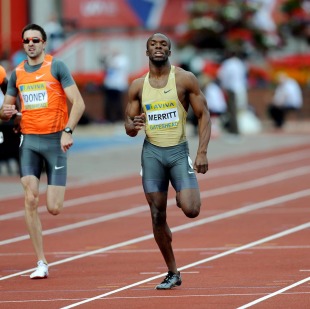- London Olympics 2012
BOA stands firm over lifetime Olympic ban

Dwain Chambers' hopes of competing at London 2012 remain in the balance after the British Olympic Association stayed defiant over its lifetime ban on drugs cheats.
The BOA has confirmed it will seek a hearing before the Court of Arbitration for Sport (CAS) in a bid to prove its selection policy does not contravene the World Anti-Doping Code.
Olympic 400m champion LaShawn Merritt, banned for 21 months after testing positive for a banned steroid in early 2010, successfully had his Olympic ban overturned by CAS. The IOC rule, which bans athletes who have received a doping suspension of more than six months from competing in the next Olympics, was subsequently nullified.
The BOA has since come under pressure to relax its policy, which prevents any athlete who serves a six-month ban for doping offences from competing for Britain in the Olympics. However, BOA chairman Colin Moynihan recently accused WADA of a "toothless" approach towards anti-doping that permits convicted drugs cheats to compete at London 2012.
But WADA president John Fahey has hit back at Moynihan, claiming his comments were "misinformed and inaccurate" and confirmed they had challenged the BOA bylaw.
"It is disappointing to read the BOA president's comments, some of which are misinformed and inaccurate, and many of which have been addressed by WADA stakeholders in the last code review, or by WADA in its present activities," Fahey said in a statement.
"Following the CAS decision in the Merritt case, determining Article 45 of the IOC charter to be an extra sanction and accordingly to be non-compliant, the IOC immediately informed WADA that the article would be nullified.
"Upon receipt of this decision, WADA immediately and diligently requested the BOA to examine its selection rule in light of the CAS ruling, on the basis that it might also be seen as an extra sanction, and hence non-compliant. So far, WADA has not received any correspondence in reply."
However, in a statement released in response, the BOA maintains the "the resolve of British athletes to compete clean has never wavered" and the bylaw exists with the overwhelming support of British athletes.
"It is the BOA's belief, shared by the overwhelming majority of athletes and most recently by the IOC Athletes' Commission that the wilful, consistent and illicit use of banned performance-enhancing drugs is the worst form of cheating in sport and so the toughest sanctions should apply," said the statement.
"Fairness in selection is essential. Cheating really does have innocent victims. There is no redemption for the clean athlete denied selection by a competitor who has knowingly cheated. The BOA wants to ensure that their voice is heard and as such the BOA has set out to vigorously defend any challenge to the selection policy, as it is a clear expression of the will and commitment of British Olympic athletes.
"In light of this development, at a meeting today the BOA Board of Directors* agreed to inform WADA that it will vigorously defend the interests of clean athletes by seeking a hearing before the CAS to address the enforceability of its selection policy, and bring clarity and closure to this issue."

